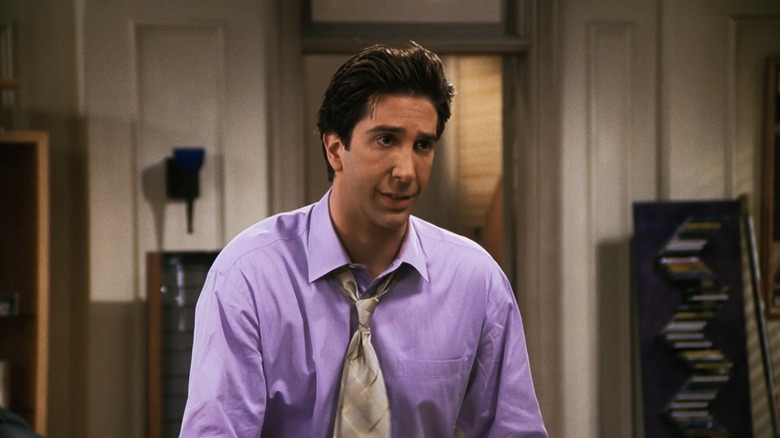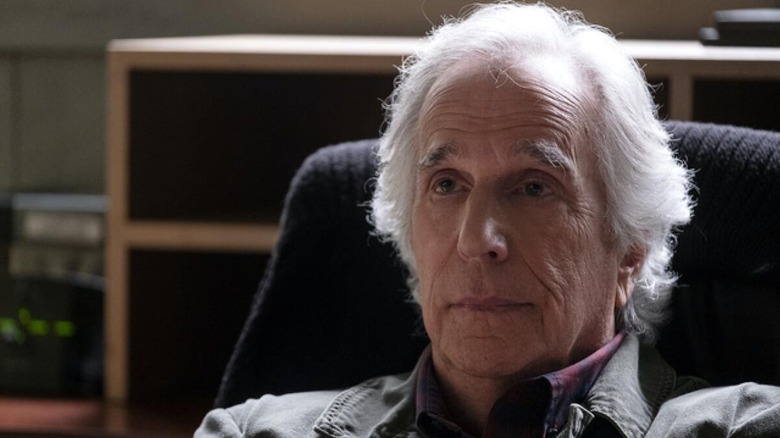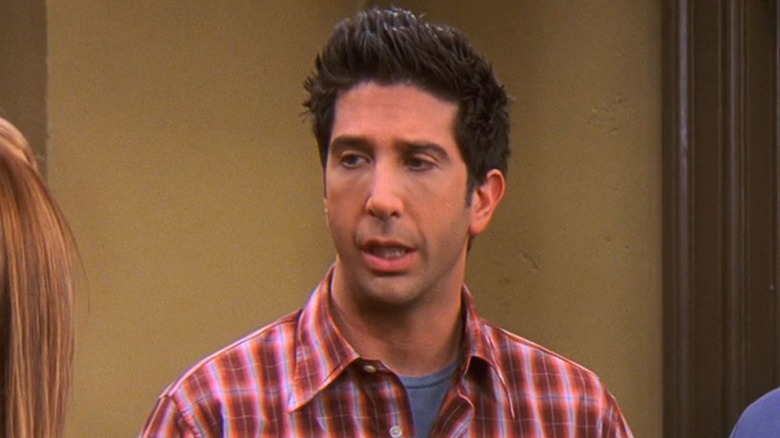Before Friends, David Schwimmer Co-Led A Short-Lived Show With A Happy Days Veteran
When the "Friends" cast landed their roles on that beloved NBC sitcom, they instantly secured their futures as some of the biggest, most well-paid stars in the world. By the end of the series in 2004, each member of the ensemble was making $1 million an episode. That means that for seasons 9 and 10 they made $42 million, and to this day, the "Friends" cast still makes quite a bit from reruns. Of course, they sacrificed much of their personal privacy in the process, and David Schwimmer has been one of the most outspoken about the negative side of mega-stardom.
In a Guardian interview, the actor recalled how prior to the show's debut, director and sitcom legend James Burrows took the cast to Las Vegas and tried to warn them of the coming onslaught. "We were walking through the casino at one point," Schwimmer recalled, "and [Burrows] said to us, 'Remember this moment, it's the last time you're going to be able to walk through a casino like this' — basically, with total anonymity." Burrows couldn't have been more right; as he was boarding a plane home from Vegas, Schwimmer remembered getting swarmed by a group of women who "grabbed" him and "wouldn't let go."
Ever since, the Ross actor has taken multiple opportunities to comment on what he sees as fans and press overstepping their bounds, describing what it's been like for the cast to endure. In the 2021 "Friends" reunion special, he spoke about the unique experience of becoming so well-known so quickly. "The fact is, no one was going through what we were going through except the other five," he explained. "Our family couldn't relate, our friends, our closest friends couldn't relate. But, the only other people who really knew what it was like were the other five." None of this is to say Schwimmer was disappointed to have landed "Friends," especially considering he had been paying his dues for some time prior to the show's debut. Even in the months before "Friends" first aired, Schwimmer had co-starred in another sitcom that probably had him praying for that kind of success.
David Schwimmer co-starred with Henry Winkler in the doomed sitcom Monty
"Friends" debuted in September 1994 and is arguably the most successful and beloved sitcom in TV history (even if it did only make number 12 on /Film's ranking of the best sitcoms of all time). The comforting purgatory of "Friends" has become a place generations of viewers revisit on a regular basis, and the show continues to command massive audiences more than two decades after its final episode aired in 2004. As such, it's hard to overstate the chances of being cast in such a show. TV history is littered with failed sitcoms that didn't last past their first season and almost every member of the "Friends" ensemble had appeared in such series. Matthew Perry, for example, may have shown up in "Growing Pains" before "Friends," but he also appeared on three other sitcoms that were canceled before their first seasons aired. He wasn't the only one, either.
The same year "Friends" was first broadcast, David Schwimmer co-led another short-lived sitcom alongside "Happy Days" veteran and then-future "Barry" star Henry Winkler. "Monty" began airing on Fox in January 1994 and ran for just one month before the network pulled the plug. Even the ill-fated sitcoms in which Perry had starred had lasted a tad longer than that. So, what was the issue?
"Monty" starred Winker (who also executive produced) as Monty Richardson, a boisterous Rush Limbaugh-style conservative TV commentator who frequently finds himself at odds with his liberal wife and children. Schwimmer played Monty's son, Greg, a Yale law-school dropout who returns from a trip to Europe with a new girlfriend and a desire to become a vegetarian chef, much to Monty's chagrin. The series also features Kate Burton as Monty's long-suffering grade school teacher wife, Fran, and David Krumholtz as the youngest Richardson son, David. If you're thinking this sounds like an "All in the Family" dynamic, it very much was, and intentionally so. That sitcom had proved a huge success in the 1970s and for some reason Winkler and co. were convinced audiences wanted to see the Fonz as an Archie Bunker type in the 1990s. (They did not.)
Monty was canceled before it was over
"Monty" aired on Fox between January and February 1994 and was canceled after six episodes, leaving seven that went unaired. Clearly, audiences didn't respond to Henry Winkler's return to the sitcom format, and with Fox pulling the plug so soon, the ratings must have been horrible. That said, the show itself wasn't necessarily as bad as the ratings would suggest — though it also wasn't great.
In a review, Variety's Tony Scott noted that writer/creator Marc Lawrence (who had previously written for "Family Ties") "draws on standard liberal and conservative lines, so there are few surprises." According to Scott, director James Burrows, who would later direct multiple episodes of "Friends" and warn David Schwimmer against the trappings of fame, managed "to find funny moments among the cliches," while the reviewer praised the pacing. Scott did, however, single out Winkler's Monty as a "one-note character." If playing Fonzie on "Happy Days" had been a curse, Monty surely wasn't much better. But Schwimmer received perhaps the most biting appraisal when Scott described him and Krumholtz as "acceptable."
Evidently, NBC, the network that would air "Friends" later that same year, originally developed "Monty" before passing on a series order. Fox then stepped in and ordered 13 episodes, but NBC clearly knew it had a dud on their hands and was right to let the show go. "Monty" seemed to belong to a bygone era of sitcoms, especially given its ambitions to emulate the success of "All in the Family." "Friends," which debuted just six months after "Monty" went off the air, couldn't have been more different. Its depiction of 20-to-30-somethings finding their way in 1990s New York felt like an evolution for the format. Though both shows were sitcoms, Schwimmer and James Burrows were really the only things linking the two, as evidenced by the massive difference in how each show was received. Still, while "Monty" wasn't Schwimmer's finest moment, at least he didn't have to worry about being swarmed at the airport.


